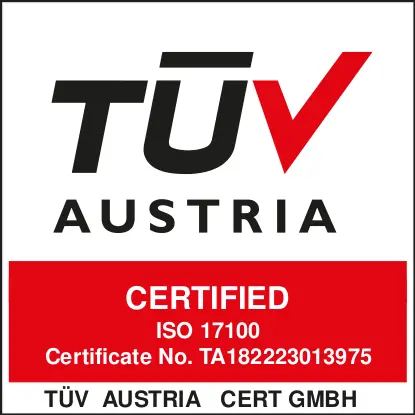As the world becomes increasingly interconnected, communicating effectively across language barriers is essential for companies and institutions. Language service providers (LSPs) are necessary in this cross-border information exchange. But how can you check the quality and reliability of translation services? This is where ISO 17100 Certification comes into play.
What is ISO 17100 Certification?
ISO 17100 is an internationally recognized certification that sets the standard for providing translation services. Established by the International Organization for Standardization (ISO), it defines stringent requirements that LSPs must meet to ensure the highest quality and efficiency in their services. In other words, it’s like a quality assurance badge that instills confidence in clients that they are getting top-notch translation services.
Who Needs ISO 17100 Certification?
While any LSP can technically offer translation services, having ISO 17100 certification indicates a commitment to quality. It’s a valuable indicator for businesses and public sector organizations seeking trustworthy and qualified LSPs, where accurate translation is imperative for legal and official purposes.
Key Requirements for ISO 17100 Certification
Human Resources
- Translators must possess proven linguistic proficiency, relevant qualifications, and industry-specific experience.
- The certification mandates continuous professional development for translators to stay updated with evolving industry standards.
Translation Process
- The certification outlines workflow processes, including client consultation, translation, revision, and quality assurance checks.
- The use of updated technology and Translation Memory systems to enhance efficiency is encouraged, although not mandatory.
Documentation and Record-keeping
- Comprehensive records of each translation project must be maintained.
- This includes contractual requirements, project specifications, and evidence of quality checks.
Benefits of ISO 17100 Certification
Credibility and Trust
The ISO 17100 certification signals potential clients that the translation services offered are of an international standard. This builds trust and can be decisive when clients choose between competing service providers.
Competitive Advantage
In a crowded marketplace, ISO 17100 serves as a differentiator. It gives certified LSPs a competitive edge, enabling them to command higher prices for their verified, high-quality service.
Streamlined Processes
The certification’s rigorous requirements often lead to streamlined operations and improved efficiency, enabling faster turnaround times without compromising quality.
Global Recognition
Being an internationally recognized standard, ISO 17100 certification facilitates easier entry into foreign markets and can even be a requirement for specific international tenders.
How to Get ISO 17100 Certified?
The certification process typically involves:
- Initial Audit: An accredited certification body assesses the LSP’s operations and resources.
- Gap Analysis: Identifies areas that need improvement to meet ISO 17100 requirements.
- Implementation: The LSP implements the suggested changes.
- Certification Audit: A final audit is conducted, after which the certification is awarded if all requirements are met.
- Ongoing Surveillance: Regular audits ensure the LSP continues to meet the standards.
For more information, please visit the ISO webpage at ISO Standart_17100.
Case Study: The Real-world Impact of ISO 17100
Consider a medical translation service. In such a critical sector where lives are at stake, accurate translation is not just desirable but imperative. Hospitals and healthcare providers will likely favor LSPs with ISO 17100 certification, as it assures them that the translated medical documents meet globally recognized standards for accuracy and reliability.
Conclusion
ISO 17100 certification is a milestone and a continuous commitment to the quality of translation services. By understanding its intricacies and value, LSPs can make informed decisions about seeking certification, and clients can better select their translation service providers.
Remember, when it comes to translation, don’t just speak the language—speak the standard. ISO 17100, to be precise.
TextUnited has undergone evaluation and received approval for meeting the requirements, standards, and guidelines set by ISO 17100 (TextUnited’s ISO 17100:2015 Certificate) for translation services. Holding ISO 17100 certification demonstrates that TextUnited possesses the necessary processes and resources to provide translation services that fulfill client needs and other relevant criteria.

